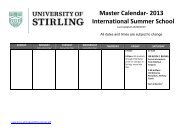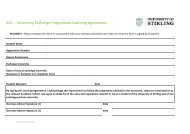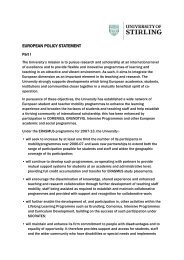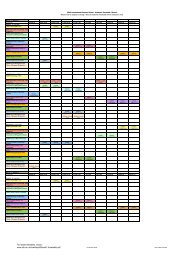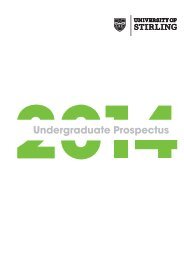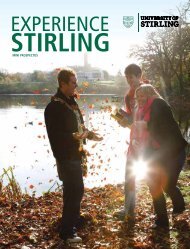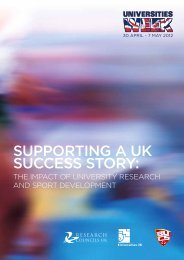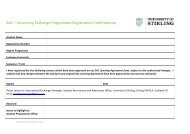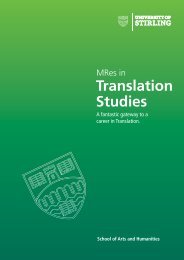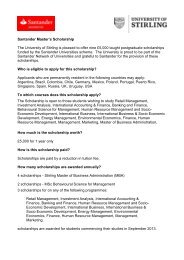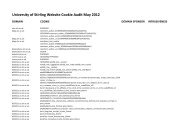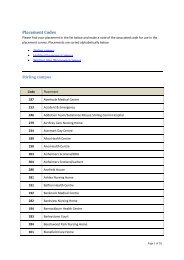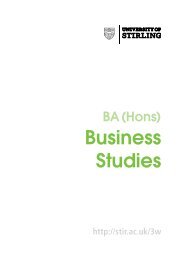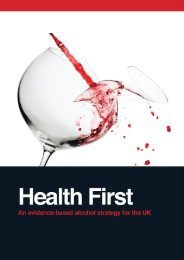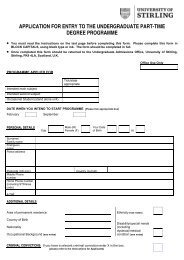Sport Strategy - University of Stirling
Sport Strategy - University of Stirling
Sport Strategy - University of Stirling
You also want an ePaper? Increase the reach of your titles
YUMPU automatically turns print PDFs into web optimized ePapers that Google loves.
Law graduate Chris McKee (front) and <strong>Sport</strong><br />
Management graduate Creag Robertson<br />
competing for <strong>Stirling</strong> <strong>University</strong> FC in the William<br />
Hill Scottish Cup. Gifted footballers receive<br />
scholarship support, helping them return to the<br />
pr<strong>of</strong>essional game and gain a quality degree for<br />
life beyond their football careers.
As Scotland’s <strong>University</strong> for <strong>Sport</strong>ing Excellence,<br />
our mission is to deliver the best for Scottish<br />
sport through the powerful and inspirational<br />
combination <strong>of</strong> sport and education.<br />
We are at the heart <strong>of</strong> Scottish sport, preparing<br />
athletes to perform on the world stage,<br />
enabling students to develop their skill sets<br />
for excellent careers and producing innovative<br />
research to improve the health <strong>of</strong> the nation.<br />
Our sport-centred campus is the hub <strong>of</strong> the<br />
local community and brings together the people<br />
shaping Scottish sport, creating a critical mass<br />
<strong>of</strong> sporting expertise and excellence.<br />
SCOTLAND’S UNIVERSITY FOR SPORTING EXCELLENCE<br />
1
2<br />
Graduate Khym Ramsay<br />
visits the library whilst at<br />
the Scottish FA National<br />
Performance Centre for<br />
Women’s Football.
CONTENTS<br />
Principal’s welcome 04<br />
Charting excellence 06<br />
A home for sport 09<br />
Inspiring performance 11<br />
A winning legacy 13<br />
Developing our knowledge 15<br />
The value <strong>of</strong> sport 17<br />
Improving health and wellbeing 19<br />
Shaping society 20<br />
Making an impact 22<br />
International focus 24<br />
The generation game 26<br />
Next steps 28<br />
SCOTLAND’S UNIVERSITY FOR SPORTING EXCELLENCE<br />
3
<strong>Stirling</strong> students and staff<br />
welcome the Olympic Torch,<br />
carried by Glasgow school<br />
pupil Jillian Hamilton.<br />
Principal’s welcome<br />
The <strong>University</strong> <strong>of</strong> <strong>Stirling</strong> is recognised<br />
nationally and internationally as a <strong>University</strong> <strong>of</strong><br />
distinction which enables individuals to fulfil<br />
their potential and contribute to prosperous,<br />
healthy and sustainable communities.<br />
Central to achieving this is the successful<br />
fusion <strong>of</strong> sport and education. Core<br />
principles <strong>of</strong> sport – determination, selfdiscipline,<br />
respect and fairness – are also<br />
fundamental life skills developed through<br />
education.<br />
When <strong>Stirling</strong> was designated as Scotland’s<br />
<strong>University</strong> for <strong>Sport</strong>ing Excellence, we set<br />
out our vision to shape the future <strong>of</strong> Scottish<br />
sport and, as the nation prepares to host<br />
further major sporting events, we are proud<br />
to continue to play our part.<br />
This report provides you with a snapshot <strong>of</strong><br />
the story so far, from investment in athletes,<br />
coaches and facilities to leading on research<br />
and teaching.<br />
Teamwork is what makes for success on and<br />
<strong>of</strong>f the sports field. Our relationship with<br />
the local community and through the many<br />
partnerships we have developed, ensures<br />
knowledge and expertise are shared.<br />
<strong>Stirling</strong> was founded on innovation and<br />
excellence and we will continue to work<br />
tirelessly to contribute towards a successful<br />
sporting future for Scotland.<br />
Pr<strong>of</strong>essor Gerry McCormac<br />
Principal and Vice-Chancellor<br />
4
The <strong>University</strong> <strong>of</strong> <strong>Stirling</strong>:<br />
• 1st in Scotland and 8th in the UK<br />
The Times Higher Education 100 Under 50,<br />
2012<br />
• 87% student satisfaction rate<br />
National Student Survey, 2012<br />
• 83% <strong>of</strong> our graduates in employment<br />
after six months<br />
Higher Education Statistics Agency, 2011<br />
In sport:<br />
• 1st in Scotland for sports research<br />
Most recent Research Assessment Exercise,<br />
2008<br />
• 1st in Scotland for <strong>Sport</strong> and Education<br />
The Times Good <strong>University</strong> Guide, 2012<br />
• 1st for sports facilities<br />
International Student Barometer, 2012<br />
The Principal (right) and Provost Mike<br />
Robbins join Dame Kelly Holmes on campus<br />
for the UK Challenge event.<br />
SCOTLAND’S UNIVERSITY FOR SPORTING EXCELLENCE<br />
5
Charting<br />
excellence<br />
Our journey<br />
UNIVERSITY OF STIRLING<br />
ESTABLISHED BY<br />
ROYAL CHARTER<br />
1967<br />
1981<br />
INTERNATIONAL<br />
SPORTS SCHOLARSHIP<br />
PROGRAMME<br />
Colin Dalgleish was the inaugural<br />
recipient <strong>of</strong> a sports scholarship, going on<br />
to represent and captain Great Britain and<br />
Ireland in golf’s Walker Cup. Since then<br />
around 800 students competing in five sports<br />
have received support, including European<br />
Tour golfer Richie Ramsay, pictured.<br />
1991<br />
MAKING A RACKET<br />
The Scottish National Tennis<br />
Centre was developed on campus, since<br />
extended to ten indoor and outdoor courts.<br />
Home to the national performance development<br />
programme, it is a former training base for<br />
Olympic gold medallist Andy Murray and Davis<br />
Cup team-mate Colin Fleming, pictured.<br />
GANNOCHY SPORTS<br />
CENTRE OPENS<br />
The first university sports centre in<br />
Scotland to open its doors to the community,<br />
its facilities are still in high demand, with more<br />
than 125 weekly classes for children and older<br />
adults as well as being the base for 40 student<br />
sports clubs.<br />
SUPPORTING<br />
SPORTING INNOVATION<br />
A SPORTING<br />
EDUCATION<br />
1969<br />
1986<br />
<strong>Stirling</strong> <strong>University</strong> Innovation Park<br />
opened for business. It is now home to The<br />
<strong>Sport</strong>ing Chance Initiative, enabling companies<br />
to make the most <strong>of</strong> commercial opportunities<br />
in sport and helping them tap into <strong>University</strong><br />
research expertise.<br />
1995<br />
Responding to the need to<br />
deliver degrees relevant to young people,<br />
we introduced undergraduate courses in<br />
<strong>Sport</strong>s Studies and modules in the science,<br />
culture and management <strong>of</strong> sport. There soon<br />
followed the first pr<strong>of</strong>essor <strong>of</strong> sport and five<br />
years on, the establishment <strong>of</strong> a Department<br />
<strong>of</strong> <strong>Sport</strong>s Studies.<br />
6
2001<br />
POOLING TOGETHER<br />
In partnership with Scottish<br />
Swimming, the <strong>University</strong><br />
established the National Swimming Academy,<br />
which includes a 50m, six-lane swimming<br />
pool. It is now a British Swimming Intensive<br />
Training Centre (ITC) for able-bodied and<br />
disability swimmers.<br />
THE DESIGNATION<br />
2008<br />
<strong>Stirling</strong> is designated Scotland’s<br />
<strong>University</strong> for <strong>Sport</strong>ing Excellence by the<br />
Scottish Government. Announcing the<br />
designation, Fiona Hyslop, Cabinet Secretary<br />
for Culture and External Affairs, said: “<strong>Stirling</strong><br />
is widely recognised as an institution that has<br />
sport very much at the heart <strong>of</strong> its identity,<br />
making it the ideal choice.”<br />
2009<br />
2010<br />
2012<br />
MATCHMAKERS<br />
Gifted young footballers were<br />
given a chance to succeed in their<br />
studies and train like pr<strong>of</strong>essionals at<br />
the Scottish FA National Performance<br />
Centre for Women’s Football.<br />
SCHOOLED<br />
IN SPORT<br />
Building on the flourishing<br />
achievements <strong>of</strong> the Department <strong>of</strong> <strong>Sport</strong>s<br />
Studies, the School <strong>of</strong> <strong>Sport</strong> was launched,<br />
<strong>of</strong>fering a breadth <strong>of</strong> study options and<br />
carrying out cutting-edge research.<br />
GAINING A<br />
SPORTING EDGE<br />
Teaming up with the sportscotland<br />
institute <strong>of</strong> sport, the <strong>University</strong> opened<br />
a state-<strong>of</strong>-the-art High Performance<br />
Medicine and <strong>Sport</strong>s Science facility.<br />
Find out more on page 11.<br />
SPORTING<br />
NETWORK<br />
DELHI DELIGHTS<br />
2009<br />
National sports scholarship<br />
programme Winning Students supported<br />
85 students athletes in its first year and<br />
now helps more than 150 aspiring World,<br />
Commonwealth and Olympic competitors<br />
studying across Scotland, including World<br />
Junior Curling medallists.<br />
2010<br />
The Delhi 2010 Commonwealth<br />
Games featured 14 current and former <strong>Stirling</strong><br />
students and a further 23 students from the<br />
Winning Students network, with a return <strong>of</strong><br />
two gold medals and one silver placing the<br />
scholarship programme equivalent to 18th<br />
place in the final standings.<br />
WHAT’S NEXT?<br />
LONDON CALLING<br />
2012<br />
Eight athletes and three members<br />
<strong>of</strong> staff represented the <strong>University</strong> at the<br />
London 2012 Olympic and Paralympic Games,<br />
where Marketing graduate Gavin Noble made<br />
history as the first Irishman to compete in an<br />
Olympic triathlon.<br />
Visit page 28 to discover our future priorities at<br />
Scotland’s <strong>University</strong> for <strong>Sport</strong>ing Excellence.<br />
7
8<br />
Children perfect their<br />
canoeing skills on the<br />
<strong>University</strong> loch, following<br />
in the footsteps <strong>of</strong> former<br />
Olympic silver medallist<br />
Campbell Walsh.
A home for sport<br />
Visit the <strong>University</strong> <strong>Sport</strong>s Centre and you<br />
might meet a pr<strong>of</strong>essional footballer, a<br />
PGA qualified golf coach or a swimming<br />
pool receptionist. You might also meet the<br />
Chief Executive <strong>of</strong> Commonwealth Games<br />
Scotland, the Head <strong>of</strong> Performance Lifestyle<br />
at the sportscotland institute <strong>of</strong> sport or the<br />
entire national triathlon squad.<br />
<strong>Stirling</strong> is a home for sport, with national<br />
training centres, governing bodies <strong>of</strong> sport,<br />
academic researchers, athletes, coaches and<br />
sports administrators working side-by-side.<br />
It’s a team effort and working together we<br />
are able to inform policy, develop sporting<br />
talent and share best practice.<br />
Our campus partners:<br />
• sportscotland institute <strong>of</strong> sport<br />
• Commonwealth Games Scotland<br />
• Scottish Gymnastics<br />
• Scottish FA Central Region<br />
• Scottish Swimming<br />
• triathlonscotland<br />
• Falkirk FC<br />
• Central <strong>Sport</strong>ing Partnership<br />
<strong>Sport</strong> at <strong>Stirling</strong> is a community affair with<br />
students, staff and local residents – young<br />
and old – all enjoying the benefits <strong>of</strong> physical<br />
activity together.<br />
Each week:<br />
• 620 children attend sports classes in<br />
golf, gymnastics, swimming, tennis and<br />
trampolining<br />
• 120 older adults participate in our Young<br />
at Heart programme<br />
• 375 students, staff and members <strong>of</strong> the<br />
community enjoy our fitness classes<br />
Each year:<br />
• Around 5,000 members use our <strong>Sport</strong>s<br />
Centre facilities<br />
• 1,500 students participate and compete<br />
against other universities<br />
• Almost 1,000 children come to our<br />
holiday sports classes<br />
• 700 pupils from Clackmannanshire,<br />
Falkirk and <strong>Stirling</strong> schools hold their<br />
school sports days on campus<br />
• 200 pupils are trained as young volunteers<br />
through Lead 2014, a partnership between<br />
Glasgow 2014 and the Youth <strong>Sport</strong> Trust<br />
• 25 weeks <strong>of</strong> work placements are <strong>of</strong>fered<br />
to school pupils, local college students<br />
and students at the <strong>University</strong><br />
SCOTLAND’S UNIVERSITY FOR SPORTING EXCELLENCE<br />
9
10<br />
Scotland Rugby international Sarah<br />
Dixon is put through testing at<br />
the <strong>University</strong>’s High Performance<br />
<strong>Sport</strong>s Science Centre.
“I am aiming to be selected<br />
for the Glasgow 2014<br />
Commonwealth Games and<br />
I’m delighted to be able to stay<br />
in Scotland to work towards my<br />
dream.”<br />
Marc Austin, pictured right<br />
European Junior Relay<br />
Gold medallist<br />
Inspiring performance<br />
Have you ever raced a cross-country skiing<br />
event on a treadmill or had 10 infrared<br />
cameras watch you in 3D?<br />
These are just two <strong>of</strong> many activities taking<br />
place in a new state-<strong>of</strong>-the-art sports science<br />
and medicine centre in <strong>Stirling</strong>, with the<br />
knowledge gained helping Scotland’s elite<br />
athletes to perform on the world stage.<br />
The facility is the first <strong>of</strong> its kind in Scotland<br />
and has been established through a joint<br />
partnership between the <strong>University</strong> and the<br />
sportscotland institute <strong>of</strong> sport.<br />
From a high velocity treadmill with built in<br />
gps designed for skiers, cyclists and athletes<br />
in wheelchairs, to a bio-mechanical analysis<br />
room using infrared cameras to analyse<br />
sporting technique, the laboratories and<br />
adjacent sports medicine and physiotherapy<br />
areas are in full effect thanks to a<br />
collaborative approach.<br />
As Dr Malcolm Fairweather, the institute’s<br />
Head <strong>of</strong> Science and Innovation, explained:<br />
“Working together with the <strong>University</strong><br />
research staff has enabled us to harness<br />
our expertise and answer key questions. I<br />
am sure these facilities and the surrounding<br />
services will have a significant impact on<br />
our elite athletes, not least by providing<br />
alternative training opportunities in<br />
Scotland.”<br />
It is open to athletes in the institute network<br />
and to students on the <strong>University</strong>’s sports<br />
scholarship programme, many <strong>of</strong> whom are<br />
one and the same, such as leading junior<br />
triathlete Marc Austin.<br />
The <strong>Stirling</strong> Applied Mathematics student<br />
has twice represented Great Britain at<br />
the European and World Championships,<br />
winning a medal in the Junior Mixed Relay.<br />
Marc said: “I am aiming to be selected for<br />
the Glasgow 2014 Commonwealth Games<br />
and I’m delighted to be able to stay in<br />
Scotland to work towards my dream. The<br />
new sports science facility will enable me to<br />
gauge exactly how my training is improving<br />
my performance level. The support team at<br />
<strong>Stirling</strong> gives me the confidence that I am<br />
getting all the information and education I<br />
need to be the best.”<br />
As with all sports facilities on campus,<br />
sports clubs and members <strong>of</strong> the local<br />
community are able to tap into the<br />
sports science set-up, not least through a<br />
dedicated sports injury clinic.<br />
SCOTLAND’S UNIVERSITY FOR SPORTING EXCELLENCE<br />
11
12<br />
Lewis Smith, pictured training<br />
at the National Swimming<br />
Academy on campus.
A winning<br />
legacy<br />
5.30am. A piercing shrill sounds from the<br />
alarm clock. The snooze button isn’t an<br />
option for swimmer Lewis Smith, with 140<br />
lengths <strong>of</strong> the 50m pool and an hour in the<br />
gym to squeeze in before his first lecture <strong>of</strong><br />
the day.<br />
There’s another 140 lengths and more land<br />
conditioning in the afternoon too, repeated<br />
six days a week for the 24-year-old <strong>Stirling</strong><br />
student, in his final year <strong>of</strong> a <strong>Sport</strong>s Studies<br />
degree.<br />
The proud Scot is putting in the hours –<br />
around 35 a week – driven by the opportunity<br />
to compete in his home country at the<br />
Glasgow 2014 Commonwealth Games.<br />
“In swimming, the Commonwealth Games<br />
is the only time you get to compete for<br />
Scotland so it would mean a lot. I’ve never<br />
found it too difficult to be motivated as I<br />
know if I don’t put the hard work in and<br />
keep improving now then I won’t make the<br />
team in the future,” said Smith.<br />
Lewis is not alone in his hectic schedule<br />
combining study and sport – indeed the<br />
length and breadth <strong>of</strong> the country, early<br />
morning alarm clocks can be heard as<br />
hundreds <strong>of</strong> gifted young students hit the<br />
water, the mat, the court and even the ice<br />
before the library and the lecture theatre.<br />
Helping them along the way is Winning<br />
Students, established in 2009 when the<br />
<strong>University</strong> <strong>of</strong> <strong>Stirling</strong> was selected by the<br />
Scottish Funding Council to run a national<br />
sports scholarship programme for student<br />
athletes.<br />
Now, the programme currently supports more<br />
than 150 athletes across 19 sports – eight <strong>of</strong><br />
which are part <strong>of</strong> the Glasgow 2014 sport<br />
programme.<br />
Eleven members <strong>of</strong> Team GB at the London<br />
2012 Olympic and Paralympic Games<br />
were current or former Winning Students,<br />
collecting two medals for the team tally.<br />
And a further 25 Winning Students<br />
represented Team Scotland at the Delhi 2010<br />
Commonwealth Games.<br />
Students are spread across a network <strong>of</strong><br />
more than 30 colleges and universities,<br />
ensuring they can access vital funding<br />
support and academic flexibility no matter<br />
where they choose to base themselves.<br />
Partnership working with national governing<br />
bodies <strong>of</strong> sport has culminated in the creation<br />
<strong>of</strong> campus-based national training centres, a<br />
lasting legacy beyond the next major Games.<br />
For Lewis, a medal winner at the Delhi 2010<br />
Games, the degree scroll will be further<br />
reward for his hard work and dedication.<br />
He said: “Your sporting life doesn’t last<br />
forever, especially for swimmers, so studying<br />
is important for me once my career finishes.<br />
There is no job I will do which will be as<br />
good as being a swimmer but if it can be<br />
even half as good then that’ll do fine.”<br />
Badminton star<br />
Kirsty Gilmour.<br />
World Junior<br />
Curling medallists.<br />
SCOTLAND’S UNIVERSITY FOR SPORTING EXCELLENCE<br />
13
14<br />
Applied Mathematics student Jack McDonald<br />
was crowned Scottish Amateur Golfer <strong>of</strong> the<br />
Year after a phenomenal season saw him<br />
finish as the highest-placed amateur at the<br />
Scottish Open, a European Tour event.
“For the first time in human<br />
evolutionary history we<br />
have 24-hour access to food<br />
and many <strong>of</strong> us are leading<br />
sedentary lifestyles.”<br />
Dr Colin Moran<br />
Lecturer in the School <strong>of</strong> <strong>Sport</strong><br />
Developing<br />
our knowledge<br />
“We know diseases like diabetes and<br />
conditions such as obesity are on the rise,”<br />
said Dr Colin Moran, a Lecturer in the<br />
School <strong>of</strong> <strong>Sport</strong>, “but our genetics have<br />
not changed. For the first time in human<br />
evolutionary history we’ve got 24-hour access<br />
to food and many <strong>of</strong> us are leading sedentary<br />
lifestyles. Our environment has changed and<br />
this has uncovered our genetics.”<br />
Dr Moran works with elite athletes and the<br />
general public to analyse the relationship<br />
between genetic and environmental<br />
differences, and the development <strong>of</strong> athletic<br />
ability, obesity, diabetes and muscle function.<br />
One <strong>of</strong> his research interests is epigenetics –<br />
or how our DNA is ‘packaged’ by proteins.<br />
This area <strong>of</strong> study analyses how the<br />
structuring <strong>of</strong> DNA affects the ‘expression’ <strong>of</strong><br />
particular genes. Unlike our genetic pr<strong>of</strong>ile,<br />
with which we are born and cannot alter, an<br />
interesting feature <strong>of</strong> epigenetics is that they<br />
can be altered by external factors like exercise.<br />
Dr Moran’s research has shown people’s<br />
responses to specific types <strong>of</strong> exercise are<br />
intrinsically linked to their genetics and<br />
epigenetics.<br />
He added: “If a group <strong>of</strong> subjects follow an<br />
exercise programme, the majority will benefit,<br />
but a minority may not and some may even<br />
experience detrimental effects. However, this<br />
same minority group shouldn’t be jettisoned to<br />
the health scrapheap and considered incapable<br />
<strong>of</strong> improvement; they just need an exercise<br />
programme targeted specifically for them.”<br />
His research has shown exercise is more<br />
important for some than others. A recent<br />
high pr<strong>of</strong>ile example <strong>of</strong> this, he says, is the<br />
difference in training styles attributed by<br />
the media to Usain Bolt and Yohan Blake<br />
during the London 2012 Olympics. It was<br />
speculated that Blake had had to train much<br />
harder than Bolt and that, despite this, Bolt<br />
was still in a better position to win because<br />
<strong>of</strong> superior athletic genes.<br />
However, Dr Moran emphasises good genes<br />
are not everything: “You could possess the<br />
genetic material to be the best sprinter in the<br />
world, but it wouldn’t do any good if you sat<br />
on the s<strong>of</strong>a all day. It’s about the combination<br />
<strong>of</strong> both genes and training and establishing<br />
what works best for each individual.”<br />
Crucially, his research has proven even<br />
those with a family history <strong>of</strong> diabetes can<br />
be as healthy as those with no genetic<br />
predisposition to the disease. “In the future,<br />
we’ll be able to match people to health<br />
programmes based on their unique genetic<br />
pr<strong>of</strong>ile, to achieve the best possible results<br />
for the least effort.”<br />
SCOTLAND’S UNIVERSITY FOR SPORTING EXCELLENCE<br />
15
16<br />
Angus Morrison tackles<br />
the hurdles in style<br />
during an athletics<br />
class at the <strong>University</strong>.
The value<br />
<strong>of</strong> sport<br />
“There is a perception that sport can improve<br />
health, generate economic benefit, reduce<br />
crime, increase educational attainment and<br />
build stronger communities,” said John<br />
Taylor, Research Fellow in the School <strong>of</strong><br />
<strong>Sport</strong>. “But, until recently, a comprehensive<br />
review <strong>of</strong> the benefits <strong>of</strong> sport had not been<br />
fully explored.”<br />
In 2003, Pr<strong>of</strong>essor Fred Coalter, now retired<br />
from the <strong>University</strong>, began a project to<br />
assess systematically the evidence <strong>of</strong> the<br />
benefits <strong>of</strong> sport through the Value <strong>of</strong> <strong>Sport</strong><br />
Monitor, a study commissioned by <strong>Sport</strong><br />
England and UK <strong>Sport</strong>.<br />
Today, this project has led to the creation<br />
<strong>of</strong> the Value <strong>of</strong> <strong>Sport</strong> Monitor, an online<br />
monitoring service <strong>of</strong> the most up-to-date<br />
reference sources, as well as critical reviews<br />
<strong>of</strong> published research about the contribution<br />
<strong>of</strong> sport to a range <strong>of</strong> broader social issues.<br />
Covering everything from crime reduction,<br />
community regeneration and education to<br />
health, wellbeing and social cohesion, the<br />
Monitor aims to provide the best evidence<br />
available, helping policy makers and<br />
practitioners to deliver what works best.<br />
John added: “Policy makers will already have<br />
some familiarity with the effect <strong>of</strong> sport on<br />
various aspects <strong>of</strong> social and economic life,<br />
but we want to ensure that this material is<br />
accessible specifically to non-sport and nonacademic<br />
audiences too.<br />
To help them, we should be able to produce a<br />
summary which consolidates all that we have<br />
learned from the available hard evidence.”<br />
Its value has been recognised internationally<br />
and is used by sport organisations worldwide,<br />
including the Australian <strong>Sport</strong>s Commission,<br />
and closer to home, sportscotland. They<br />
have recently commissioned the <strong>University</strong><br />
to develop further its potential in informing<br />
priorities on where to invest in sport to ensure<br />
it has the greatest impact.<br />
Importantly, the monitor also highlights<br />
challenges with the definitions <strong>of</strong> terms used<br />
in sport and identifies the need for more<br />
robust research into the benefits <strong>of</strong> sport.<br />
“The Value <strong>of</strong> <strong>Sport</strong> Monitor is an excellent<br />
resource for academics, students, sports<br />
practitioners and policy makers,” concluded<br />
John. “It can help raise the quality <strong>of</strong><br />
debate in sport and is a useful resource for<br />
determining research agendas.”<br />
SCOTLAND’S UNIVERSITY FOR SPORTING EXCELLENCE<br />
17
“I would like to develop an<br />
education programme to<br />
prepare athletes for their<br />
career transitions, while also<br />
helping them to develop a<br />
good work-life balance.”<br />
Sunghee Park, a former<br />
Olympic and World Tour<br />
tennis player, is using her PhD<br />
research completed at <strong>Stirling</strong><br />
in her new role as a sports<br />
psychologist.<br />
18
Improving<br />
health and<br />
wellbeing<br />
Active <strong>Stirling</strong>’s Tricia<br />
Cumming and <strong>University</strong><br />
Fitness Officer Aidan Innes<br />
launch Medal Routes.<br />
Researchers at <strong>Stirling</strong> believe walking<br />
could play an important role in fighting<br />
depression, a condition which affects as<br />
many as one in 10 British adults at some<br />
point during their lives.<br />
Physical exercise is recommended as a<br />
treatment option for people with mild<br />
depression, but a study led by health<br />
researchers from the <strong>University</strong>’s Centre for<br />
Public Health and Population Health found<br />
even a basic activity such as walking can<br />
have a positive effect.<br />
The researchers identified and analysed<br />
data from eight studies considering the<br />
impact <strong>of</strong> walking interventions on a total<br />
<strong>of</strong> 341 patients.<br />
Roma Robertson, a <strong>Stirling</strong> PhD student,<br />
worked with colleagues at the <strong>University</strong><br />
<strong>of</strong> Edinburgh. She said: “We found that<br />
walking has a statistically significant, large<br />
effect on the symptoms <strong>of</strong> depression in<br />
some populations and is as effective as other<br />
forms <strong>of</strong> physical activity.<br />
“People working in primary care have a<br />
limited range <strong>of</strong> options as to what they<br />
can <strong>of</strong>fer people with depression and<br />
treatments such as anti-depressants aren’t<br />
always effective and come with potential<br />
side-effects.”<br />
<strong>Stirling</strong>’s own scenic campus is already<br />
home to a number <strong>of</strong> walking groups,<br />
including for postnatal mums, and is<br />
Ramblers Scotland’s first Medal Routes<br />
Walking Hub, a national healthy living<br />
project inspired by the Glasgow 2014<br />
Commonwealth Games.<br />
<strong>Stirling</strong>’s core research strengths lie in:<br />
sport; culture and society; environment and<br />
communities; enterprise and economy and<br />
health and wellbeing.<br />
SCOTLAND’S UNIVERSITY FOR SPORTING EXCELLENCE<br />
19
Shaping<br />
society<br />
“They learn to live with and<br />
tolerate other social and cultural<br />
distinctions and make friends with<br />
a range <strong>of</strong> youngsters, <strong>of</strong>ten for<br />
the rest <strong>of</strong> their lives.”<br />
Dr Joe Bradley, Senior Lecturer<br />
An unlikely sport is helping to build social<br />
capital and address a number <strong>of</strong> deep-rooted<br />
societal problems in one multi-cultural<br />
Scottish community.<br />
Gaelic Football is the focus <strong>of</strong> a project<br />
in Coatbridge which has been trying to<br />
transform lives by challenging the barriers<br />
which inhibit young people from fulfilling<br />
their potential.<br />
The Active Communities project was first<br />
established with the aim <strong>of</strong> addressing the<br />
damaging health and family breakdown<br />
statistics which besmirch this postindustrial<br />
town.<br />
Dr Joe Bradley, an authority in researching<br />
sport's relationship with identity, culture,<br />
religion and ethnicity also happens to be a<br />
keen Gaelic Football player. He delayed his<br />
planned retirement from the sport to lend<br />
his leadership to the project.<br />
“Vibrant sports activities, participation and<br />
volunteering provide alternatives to what<br />
gives rise to many <strong>of</strong> these social problems in<br />
the first place,” said Bradley, a Senior Lecturer<br />
at <strong>Stirling</strong> and qualified school teacher.<br />
“The intention is that pupils learn positive<br />
habits in relation to communication, health,<br />
fitness and social aspirations. The sport also<br />
helps them to make positive decisions and<br />
not only to keep good company, but also to<br />
create it in a stable and supportive setting.”<br />
Gaelic Football activity in Coatbridge has<br />
grown to become the biggest minority sport<br />
across North Lanarkshire and the largest<br />
regular sporting activity in Coatbridge<br />
primary schools and beyond.<br />
Each week, 500 pupils aged nine to 16<br />
receive coaching as part <strong>of</strong> their school<br />
timetable, with a 98 percent participation rate<br />
recorded. For many pupils, it represents their<br />
first and only experience <strong>of</strong> being coached to<br />
play a competitive team sport and being able<br />
to represent their school at sport.<br />
Bucking the trend <strong>of</strong> declining sporting<br />
participation, the project has led to a thriving<br />
club scene outside school time and a packed<br />
activity calendar with Gaelic Football from<br />
spring to early winter and handball <strong>of</strong>fered<br />
through the <strong>of</strong>f-season.<br />
The results on the pitch are there for all to<br />
see, with 18 <strong>of</strong> the 20-strong Scotland boys’<br />
squad competing at the 2012 Feile World<br />
U14 Championships in Ireland coming from<br />
Coatbridge whilst the Coatbridge girls were<br />
crowned 2012 Ladies British Gaelic Football<br />
Champions.<br />
The focus, however, is not simply on winning<br />
matches.<br />
Dr Bradley added: “When the kids come<br />
to the after-school classes they can wear<br />
whatever kit they want. They are not asked<br />
to stop being whatever they are, but simply<br />
that they and their families see the Gaelic<br />
Football environment as a space where they<br />
discover more about other individuals and<br />
appreciate that under every football strip<br />
there is a person.<br />
“The hope is they learn to live with and<br />
tolerate other social and cultural distinctions<br />
and make friends with a range <strong>of</strong><br />
youngsters, <strong>of</strong>ten for the rest <strong>of</strong> their lives.”<br />
20
Coatbridge Davitts U14 Girls<br />
admire a good season’s<br />
work in the shape <strong>of</strong> the<br />
All-Britain Gaelic Football<br />
Trophy won in London.<br />
Coatbridge Davitts U12 Boys<br />
line out to play in a national<br />
Gaelic Football tournament<br />
held in Birmingham.<br />
SCOTLAND’S UNIVERSITY FOR SPORTING EXCELLENCE<br />
21
Making an impact<br />
A matter <strong>of</strong><br />
coaching expertise<br />
Former Scotland international footballer<br />
Pauline Hamill is now coaching the next<br />
generation at the Scottish FA National<br />
Performance Centre for Women’s Football.<br />
The move from player to coach is not<br />
without its pitfalls, but Hamill has tapped<br />
into Coaching Matters, a pr<strong>of</strong>essional<br />
development programme to brush up on<br />
her knowledge.<br />
“To have discussions with other<br />
elite performance coaches has been<br />
very interesting as every sport can<br />
learn from each other,” said Hamill.<br />
“It is really important you stay<br />
ahead <strong>of</strong> the game and are always<br />
open to becoming better.<br />
“I work with our most talented national team<br />
and youth players on a daily basis and I want<br />
to develop my own knowledge and in turn<br />
help them reach their full potential. Even the<br />
smallest detail is important so if I can learn<br />
from other coaches and pick up a couple <strong>of</strong><br />
things at these courses, then it is worthwhile.”<br />
Coaching Matters, delivered by the<br />
<strong>University</strong> in partnership with sportscotland,<br />
was established by Senior Teaching Fellow<br />
Alan Lynn, a former Scottish Swimming<br />
Technical Director. General and sport-specific<br />
workshops run throughout the year.<br />
An informed<br />
sporting future<br />
Doping in sport remains a contentious<br />
issue but have we learned the lessons<br />
from the past?<br />
Dr Paul Dimeo has always been interested<br />
in exploring ethical dilemmas surrounding<br />
sport and his expertise was rewarded with<br />
a Fulbright Award, funding further research<br />
into doping activity during the Cold War.<br />
From the state-sponsored doping<br />
programmes in the German Democratic<br />
Republic (GDR) and the USSR to the use<br />
<strong>of</strong> steroids in the USA, Canada and UK, Dr<br />
Dimeo has been analysing differences in<br />
perceptions between doping activity.<br />
He said: “My research compares both sides<br />
<strong>of</strong> the ‘Iron Curtain’, considering factors like<br />
nationalism, the state, the role <strong>of</strong> doctors<br />
and coaches, athletes’ attitudes and drug<br />
supply networks. This will provide fuller<br />
understanding <strong>of</strong> how doping developed<br />
and a more balanced appraisal <strong>of</strong> the past.<br />
“Future research must address why<br />
athletes might be at risk <strong>of</strong> doping,<br />
and what prevents other athletes<br />
from doping when presented<br />
the opportunity. By furthering<br />
knowledge in this area, antidoping<br />
education strategies can be<br />
more targeted and effective.”<br />
22
Graduates shape<br />
an ideal future<br />
“There’s something unique about Africa and<br />
its ability to charm you,” explains Journalism<br />
graduate Andrew Jenkin, one <strong>of</strong> several<br />
former <strong>Stirling</strong> students hooked by their<br />
Zambian experience.<br />
Two <strong>of</strong> more than 40 <strong>Stirling</strong> students to be<br />
selected for the IDEALS project, Andrew and<br />
physical education graduate Hayley Barr both<br />
spent six weeks in capital city Lusaka in 2009.<br />
A UK <strong>Sport</strong> initiative, it sees sport and<br />
media students trained to deliver sporting<br />
activities to young Zambians, helping<br />
to improve the quality <strong>of</strong> their lives and<br />
delivering key health messages.<br />
Hayley Barr pictured with<br />
Moses Ndhlovu (centre)<br />
and Laz Kachasa, who work<br />
for Edu<strong>Sport</strong> in the district<br />
<strong>of</strong> Kalingalinga.<br />
Six weeks soon led to a further four months<br />
as Andrew helped to publicise the project<br />
before returning to Scotland where he<br />
started Africa on the Ball, a non-pr<strong>of</strong>it<br />
organisation which uses football for social<br />
development in deprived communities. “The<br />
Zambia project helped me to develop in a<br />
personal and pr<strong>of</strong>essional sense,” added<br />
Andrew. “The experience is one that stays<br />
with you forever.”<br />
For Hayley, now a physical education teacher<br />
back in Scotland, she moved from coaching a<br />
girls’ netball team to raising enough funds for<br />
a netball court in the heart <strong>of</strong> the community.<br />
She said: “I was in charge <strong>of</strong> 49<br />
students every day for four months<br />
– that prepares you for anything.<br />
The experience heightened my<br />
interest in education and influences<br />
everything I have done since then.”<br />
The new netball court is<br />
<strong>of</strong>ficially opened in Lusaka.<br />
SCOTLAND’S UNIVERSITY FOR SPORTING EXCELLENCE<br />
23
International focus<br />
<strong>Sport</strong> management experts at the <strong>University</strong><br />
have led a world-first, interdisciplinary<br />
research project to raise the pr<strong>of</strong>ile <strong>of</strong><br />
Malaysia as a sporting nation on the<br />
international stage.<br />
Through partnership with the Malaysian<br />
Government, <strong>Stirling</strong> was contracted to carry<br />
out a programme <strong>of</strong> research into building<br />
the capacity <strong>of</strong> the Malaysian sport industry.<br />
It addressed everything from a review<br />
<strong>of</strong> national sports associations and<br />
benchmarking sport’s contribution to the<br />
economy to reviewing its sports retailing and<br />
development <strong>of</strong> a sponsorship infrastructure.<br />
Pr<strong>of</strong>essor Leigh Robinson, Director <strong>of</strong> Research<br />
in the School <strong>of</strong> <strong>Sport</strong>, led the research team<br />
which brought together further experts in<br />
retail studies, sport finance and economics.<br />
She said: “We were delighted to be given<br />
the opportunity to make a positive difference<br />
to the Malaysian sport industry. One <strong>of</strong> the<br />
most valuable aspects <strong>of</strong> the project was<br />
the way in which it enabled experts from<br />
different disciplines to work together to cover<br />
a comprehensive range <strong>of</strong> issues.<br />
An advert promoting the year <strong>of</strong> <strong>Sport</strong>s<br />
Industry in Malaysia.<br />
“Now the foundations have been laid<br />
to build the capacity <strong>of</strong> a vibrant and<br />
sustainable sports industry in Malaysia, we<br />
look forward to seeing progress go from<br />
strength-to-strength.”<br />
24
“My game improved<br />
considerably during my time at<br />
<strong>Stirling</strong> and with their support<br />
I was able to fulfil my dream<br />
<strong>of</strong> competing at Wimbledon.<br />
When I’m not on tour, I still love<br />
coming back and training at the<br />
<strong>University</strong> as it has a special<br />
atmosphere.”<br />
ATP Tour Tennis player<br />
Colin Fleming, a First Class<br />
Honours Economics and<br />
Finance graduate.<br />
SCOTLAND’S UNIVERSITY FOR SPORTING EXCELLENCE<br />
25
The generation<br />
game<br />
A trio <strong>of</strong> innovative sports qualifications<br />
developed at the <strong>University</strong> will improve<br />
lives within local communities, benefitting<br />
everyone from nursery children through to<br />
older adults.<br />
There is a qualification training nursery<br />
staff to improve children’s fundamental<br />
movement skills, another giving pupils CVbuilding<br />
fitness qualifications and one to<br />
develop activities for people with dementia.<br />
<strong>Sport</strong>s Participation Officer Nikki Duffy<br />
devised the SQA accredited courses in<br />
partnership with colleagues across the<br />
<strong>University</strong>. She explained: “The courses are<br />
helping people to develop leadership skills,<br />
enhance knowledge and improve confidence<br />
in the delivery <strong>of</strong> sport and fitness activities<br />
to the wider community.”<br />
Nursery staff and sports coaches at<br />
Beaconhurst School in Bridge <strong>of</strong> Allan were<br />
part <strong>of</strong> a successful pilot project <strong>of</strong> the<br />
Fundamental Movement Skills Award, aimed<br />
at children aged four to eight.<br />
School Director <strong>of</strong> <strong>Sport</strong>, Judith Ramsay,<br />
said: “Taking part in daily physical activity<br />
at a young age helps confidence levels and<br />
behaviour. It also makes the most <strong>of</strong> the<br />
small window <strong>of</strong> opportunity when children<br />
need to develop the basic skills they will use<br />
for the rest <strong>of</strong> their lives. Working with the<br />
<strong>University</strong> has been an exciting new venture<br />
and staff have embarked on the project with<br />
real enthusiasm.”<br />
The positive effect regular exercise can have<br />
on people with dementia is explored in a<br />
dedicated qualification for carers. As well as<br />
providing top tips on simple and effective<br />
activities <strong>of</strong> benefit to people with dementia,<br />
it also outlines the physiological aspects <strong>of</strong><br />
ageing and dementia.<br />
“Residents have been much more positive<br />
about taking part in the activities and I am<br />
now able to point out the physical benefits<br />
to them,” said Yvonne Gilchrist, Activity<br />
Co-ordinator at Richmond House Residential<br />
Care Home in Crieff.<br />
“I don’t have a medical background and it<br />
can be worrying that you might do someone<br />
more harm than good but now I feel<br />
confident I can help our residents stay as<br />
active as possible.”<br />
26
"Now I feel confident I can<br />
help our residents stay as<br />
active as possible."<br />
Yvonne Gilchrist, Activities<br />
Co-ordinator at Richmond<br />
House Residential Care Home<br />
Abronhill High School pupils Demi<br />
Mitchell, Scott Smith and Leigh<br />
McKeown complete the Young<br />
Fitness Leader qualification.<br />
Beaconhurst School staff completed<br />
the Fundamental Movement Skills<br />
Award for their nursery children.<br />
SCOTLAND’S UNIVERSITY FOR SPORTING EXCELLENCE<br />
27
Next steps<br />
The <strong>University</strong> has identified a number <strong>of</strong><br />
important priorities for Scotland’s <strong>University</strong> for<br />
<strong>Sport</strong>ing Excellence:<br />
• Further develop our campus as a world-class<br />
gathering place for Scottish sport<br />
• Support high performance athletes and<br />
coaches in their pursuit <strong>of</strong> excellence<br />
• Provide opportunity and employability<br />
through education and sport<br />
• Lead on coaching expertise, knowledge and<br />
development<br />
• Excel in research which sets the sport and<br />
health agenda<br />
• Target economic development through sport<br />
• Use the inspirational power <strong>of</strong> sport to<br />
change lives<br />
28
<strong>Sport</strong> at <strong>Stirling</strong><br />
www.stir.ac.uk/sport-at-stirling<br />
Winning Students<br />
www.winningstudents-scotland.ac.uk<br />
<strong>University</strong> <strong>of</strong> <strong>Stirling</strong><br />
<strong>Stirling</strong><br />
FK9 4LA<br />
Scotland<br />
United Kingdom<br />
T: +44 (0) 1786 466 489<br />
E: sport@stir.ac.uk<br />
Designed by Zero Design. Produced by Development & External Affairs.<br />
Photos with thanks to: British Triathlon, DKH Trust, Gbswimstars, Ian MacNicol, Joe Bradley, Katy Whitelaw,<br />
Kenny Smith Photography, Mark Ferguson, Megan Kelland, SNS, Steve Lindridge, Sunday Mail, Tennis Korea,<br />
Tom Main and triathlonireland.<br />
The <strong>University</strong> <strong>of</strong> <strong>Stirling</strong> is a recognised Scottish charity with number SC 011159.
www.stir.ac.uk



